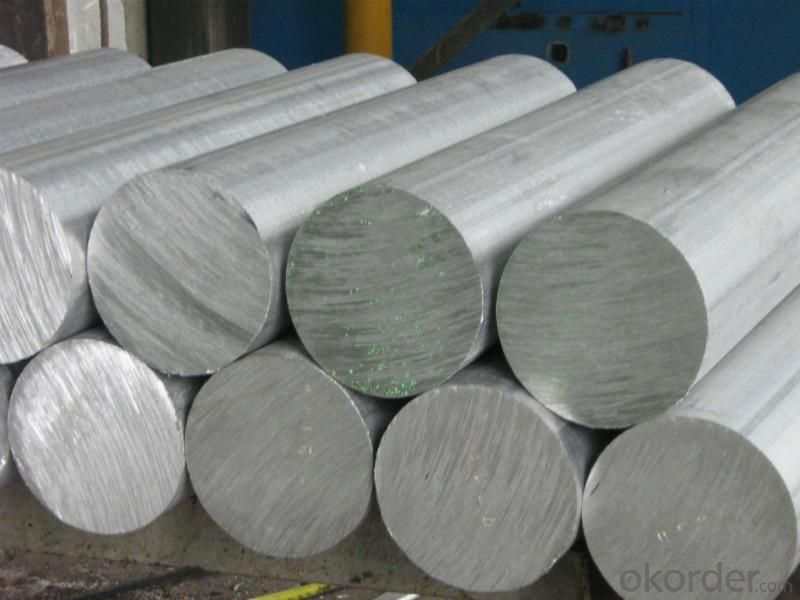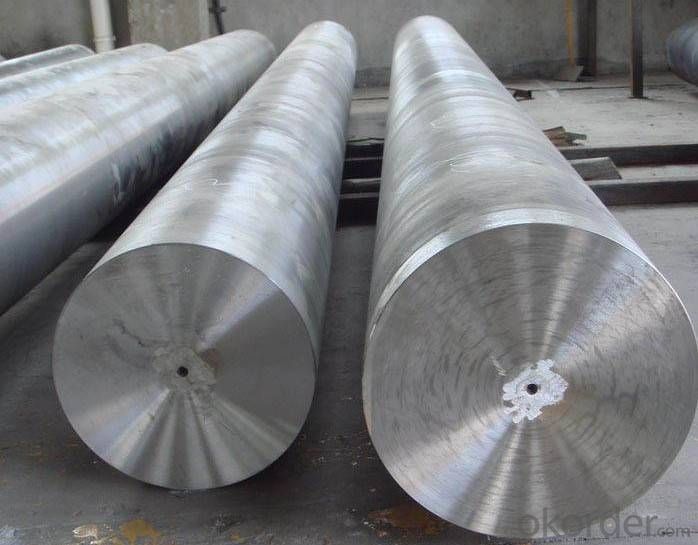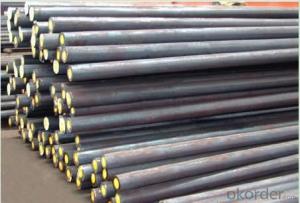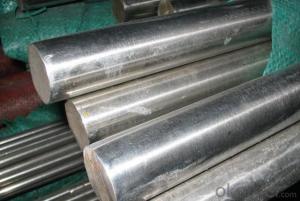AISI 1060 Carbon Steel Sae 1060 Steel Round Bar
- Loading Port:
- Tianjin
- Payment Terms:
- TT OR LC
- Min Order Qty:
- 25 m.t.
- Supply Capability:
- 50000 m.t./month
OKorder Service Pledge
OKorder Financial Service
You Might Also Like
Item specifice
AISI 1060 Carbon Steel Sae 1060 Steel Round Bar
Product Description:
Carbon steel, stock available in annealed and QT condition.
Flexible MOQ for order.
Delivery 5-10 days.
Good tolerance according the the OD.
Staightness could meet 1mm/M per requirement
Specification:
Round bar | Diameter: 4mm~800mm | |||||
Angle bar | Size: 3mm*20mm*20mm~12mm*800mm*800mm | |||||
Square bar | Size: 4mm*4mm~100mm*100mm | |||||
Flat bar | Thickness: 2mm~100mm | |||||
Width:10mm~500mm | ||||||
Hexagonal | Size: 4mm~800mm | |||||
Length: 2m,4m,5.8m,6m,11.8m,12m or as required. | ||||||
Chemical Composition:
Standard | C | Si | Mn | Cr | Mo | P/S ≤ |
DIN | 0.42-0.60 | 0.4 | 0.50-0.80 | 0.02 | 0.1 | 0.03 |
GB | 0.42-0.60 | 0.4 | 0.50-0.80 | 0.02 | 0.1 | 0.03 |
Characteristic:
General purpose medium carbon steel delivered in as rolled condition. It can be further heat treated to achieve specific mechanical properties. The 0.45% carbon content is not favorable for welding. However, it can be weld with appropriate pre and post weld heat treatment. Surface hardness of 57~62 HRC can be achieved with cast hardening to a depth of approximately 1mm. Used for most transmission and motor parts of medium strength. Case hardened parts such as camshafts, gears, rocking levers etc. Simple hand tools and various types of fasteners and fixtures, machinery parts and components with medium stress.
Product Show:


- Q:What is the impact of grain size on the mechanical properties of special steel?
- The mechanical properties of special steel are significantly affected by the size of its grains. Grain size refers to the dimensions and arrangement of individual crystals within the steel structure. It is determined by various factors, including the speed at which the steel solidifies and subsequent heat treatments. In general, smaller grain sizes in special steel result in improved mechanical properties. This is because smaller grains provide more grain boundaries, which act as obstacles to the movement of dislocations and enhance the steel's strength. Smaller grains also contribute to a more uniform microstructure, enhancing overall toughness and resistance to fracture. Furthermore, smaller grain sizes promote higher hardness and increased resistance to wear in special steel. This is because the greater number of grain boundaries impedes dislocation movement, preventing plastic deformation and resulting in higher hardness values. Conversely, larger grain sizes can have a detrimental effect on the mechanical properties of special steel. Larger grains have fewer grain boundaries, allowing dislocations to move more freely. As a result, the strength, toughness, and hardness of the steel are diminished. Additionally, larger grains can lead to anisotropic behavior, where the mechanical properties vary in different crystallographic directions. This makes the steel more vulnerable to failure under specific loading conditions. Therefore, it is crucial to control and optimize the grain size in special steel to achieve the desired mechanical properties. This can be accomplished through precise heat treatments, such as annealing or quenching, which regulate the cooling rate and subsequent recrystallization processes. By controlling the grain size, special steel can be tailored to meet specific application requirements, ensuring optimal mechanical performance and reliability.
- Q:How is corrosion-resistant alloy steel used in the production of chemical processing equipment?
- Corrosion-resistant alloy steel is widely used in the production of chemical processing equipment due to its ability to withstand harsh chemical environments. It is used to construct various components such as pipes, tanks, valves, and heat exchangers, providing excellent resistance to corrosion and chemical attack. This ensures the integrity and longevity of the equipment, preventing leaks, contamination, and potential hazards. Additionally, corrosion-resistant alloy steel offers high strength and durability, making it suitable for handling aggressive chemicals and maintaining operational efficiency in chemical processing plants.
- Q:What are the characteristics of tool steel?
- Tool steel is a type of steel that possesses several distinctive characteristics. Firstly, it is known for its exceptional hardness, making it highly resistant to wear and abrasion. Additionally, tool steel has excellent toughness and strength, allowing it to withstand high impact forces without fracturing. It also exhibits good heat resistance, retaining its hardness and strength even at elevated temperatures. Another notable characteristic of tool steel is its ability to be easily shaped and machined, making it a preferred choice for manufacturing tools and equipment. Overall, the key attributes of tool steel include hardness, toughness, strength, heat resistance, and machinability.
- Q:Can special steel be used for making oil and gas industry components?
- Yes, special steel can be used for making oil and gas industry components. Special steel alloys are often preferred in this industry due to their excellent strength, corrosion resistance, and high temperature properties. These components are subjected to harsh conditions and require materials that can withstand extreme pressures, temperatures, and corrosive environments. Special steel alloys, such as stainless steel or superalloys, are specifically designed to meet these demanding requirements, making them suitable for manufacturing oil and gas industry components.
- Q:What are the challenges in casting special steel?
- Some of the challenges in casting special steel include achieving the desired composition and metallurgical properties, controlling the cooling rate to prevent the formation of defects such as cracks or porosity, ensuring uniformity and consistency in the casting process, and managing the high temperatures and corrosive environments involved. Special steel often requires precise and complex casting techniques, making it more challenging than casting regular steel. Additionally, special steel alloys may have specific requirements for heat treatment or post-casting processing, which adds further complexity to the casting process.
- Q:How does special steel compare to other materials, such as aluminum or titanium?
- Special steel is known for its exceptional strength, durability, and resistance to wear and tear, making it superior to materials like aluminum or titanium in various applications. While aluminum is lightweight, it lacks the same level of strength and toughness as special steel. Titanium, on the other hand, offers comparable strength but is significantly more expensive. Special steel strikes a balance between strength, cost-effectiveness, and versatility, making it a preferred choice in many industries.
- Q:How does special steel perform in high-temperature creep?
- Special steel has been specifically engineered to excel in conditions of high-temperature creep. Creep refers to the material's inclination to deform over time under consistent stress at elevated temperatures. Due to its unique composition and heat treatment procedures, special steel demonstrates exceptional resistance to creep. The alloying elements, including chromium, nickel, and molybdenum, significantly enhance its strength at high temperatures and its ability to resist creep. These elements create stable carbides and enhance the material's capacity to maintain its structural integrity even when exposed to elevated temperatures. Additionally, special steel often undergoes specific heat treatment methods, such as annealing or quenching and tempering, to further improve its resistance to creep. These processes refine the steel's microstructure, reduce internal stresses, and enhance its overall mechanical properties. The combination of alloying elements and heat treatment processes endows special steel with exceptional resistance to creep. It can endure prolonged exposure to high temperatures without significant deformation or failure. This makes special steel an ideal choice for applications involving high-temperature and high-stress conditions, such as gas turbines, petrochemical plants, and power generation facilities. In conclusion, the performance of special steel in situations of high-temperature creep is exceptional, and it is widely acknowledged as a dependable and durable material for applications requiring resistance to thermal deformation and long-term stability under constant stress.
- Q:How does special steel contribute to reducing product defects during manufacturing?
- Special steel contributes to reducing product defects during manufacturing by offering superior strength, durability, and resistance to corrosion. It ensures the production of high-quality components that are less prone to wear, deformation, or breakage, minimizing the occurrence of defects. Additionally, special steel's consistent composition and precise manufacturing processes enable tighter tolerances, resulting in more accurate and reliable products.
- Q:How does special steel perform in marine applications?
- Special steel performs exceptionally well in marine applications due to its excellent corrosion resistance and high strength. The steel is specifically designed to withstand harsh marine environments, such as saltwater, which can cause corrosion and deterioration in other materials. Its resistance to corrosion ensures durability and longevity, making it an ideal choice for various marine components and structures, including ships, offshore platforms, and underwater equipment. Additionally, the high strength of special steel enhances the structural integrity and load-bearing capacity of marine applications, providing superior performance and safety in challenging conditions.
- Q:How does special steel contribute to reducing product costs while maintaining quality?
- Special steel contributes to reducing product costs while maintaining quality through various ways. Firstly, special steel offers higher strength and durability, allowing manufacturers to create lighter and more efficient designs. This reduces material usage and transportation costs while maintaining the desired product performance. Additionally, special steel's exceptional corrosion resistance minimizes the need for expensive protective coatings or frequent maintenance, saving on long-term costs. Its superior heat resistance also enables manufacturers to use less energy during production processes, resulting in reduced operational expenses. Furthermore, special steel's unique properties, such as high machinability and formability, enhance manufacturing efficiency. This leads to reduced production time, lower labor costs, and increased overall productivity. Overall, the use of special steel in product manufacturing optimizes cost-efficiency without compromising quality, making it an indispensable material for many industries.
1. Manufacturer Overview |
|
|---|---|
| Location | |
| Year Established | |
| Annual Output Value | |
| Main Markets | |
| Company Certifications | |
2. Manufacturer Certificates |
|
|---|---|
| a) Certification Name | |
| Range | |
| Reference | |
| Validity Period | |
3. Manufacturer Capability |
|
|---|---|
| a)Trade Capacity | |
| Nearest Port | |
| Export Percentage | |
| No.of Employees in Trade Department | |
| Language Spoken: | |
| b)Factory Information | |
| Factory Size: | |
| No. of Production Lines | |
| Contract Manufacturing | |
| Product Price Range | |
Send your message to us
AISI 1060 Carbon Steel Sae 1060 Steel Round Bar
- Loading Port:
- Tianjin
- Payment Terms:
- TT OR LC
- Min Order Qty:
- 25 m.t.
- Supply Capability:
- 50000 m.t./month
OKorder Service Pledge
OKorder Financial Service
Similar products
New products
Hot products
Hot Searches
Related keywords





























